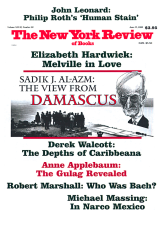To the Editors:
I am grateful to Mr. Lilla for the friendly tone of his review of Justice is Conflict [NYR, May 11]. Unfortunately he seems wholly uninterested in philosophy and Justice is Conflict is a philosophical argument, not a political thesis, and this argument he largely ignores in his review.
The redefinition of reason, as a universal, as adversary reasoning in conditions of conflict or uncertainty; the derivation of the habit of private reasoning (in the soul) from the habit of public reasoning (in the city), and the natural return of private arguments and commitments into public arguments and commitments; the necessity of customary procedures; the inevitability of the conflicts which we all experience in the soul and the corresponding conflicts in the city, and the common way of resolving them, if they are to be resolved at all: this is the sphere of politics, of unending politics.
There is a well-known contrast between thought as imagination and thought as rational discussion, and through this contrast we can understand why there are, as relativists observe, no great goods which all persons everywhere and always admire and pursue; while there are great evils which all persons everywhere and always fear, against which they require protection from their social and political institutions: there is no relativism here, but rather the insights of Thomas Hobbes, who—unlike Plato and Aristotle, who were always refining the good—recognized fear as the dominant emotion in politics.
These are some of the steps in the argument, which obviously does not pretend to be conclusive, but rather to be coherent and persuasive. Our moral feelings, like our directly sexual feelings, are elaborated by our imaginations, and we expect as many peculiarities and deviances as there are individual temperaments. But we have our political and moral friends and our political and moral enemies and the contests occasioned by the horrors of life are always serious.
As for “exasperating gentility”? I learned from Spinoza that rant and rhetoric, and even talk about the Enlightenment, are not needed in philosophy. But not to exasperate Mr. Lilla, perhaps I shall try to be rather more raucous in the future.
Stuart Hampshire
Oxford, England
Mark Lilla replies:
I am sorry that Stuart Hampshire does not feel I did justice to the argument of his book, despite my interest in what I took to be his philosophy. I would encourage readers to examine the book itself, which in any case deserves serious attention. I would only remind them that the issue I tried to raise in my review concerned an issue I felt had been excluded from the book—an analysis of the passions that often give rise to the most destructive conflicts in the soul and city, and the need to temper them—and which made Mr. Hampshire’s argument appear to me more narrow and genteel than he evidently intended.
This Issue
June 15, 2000



